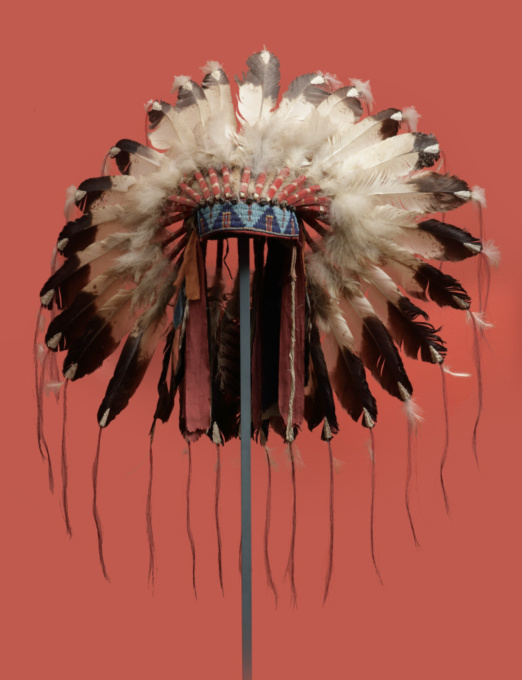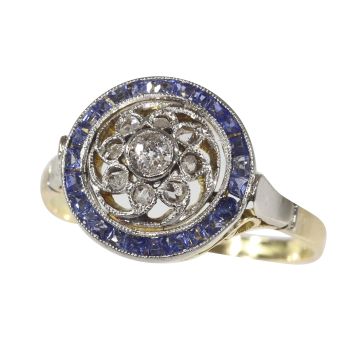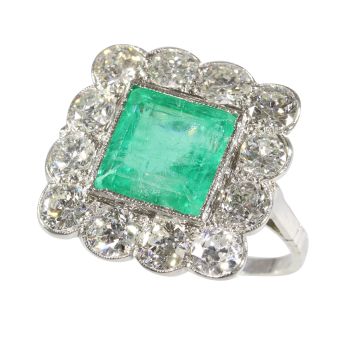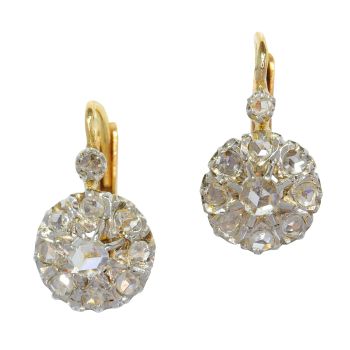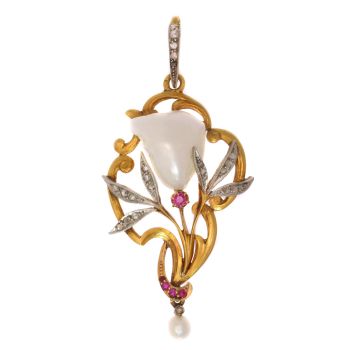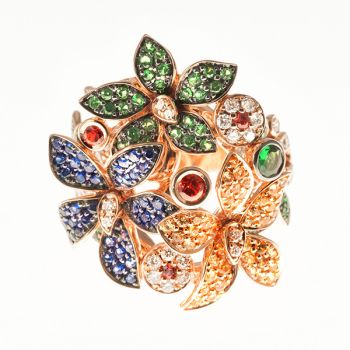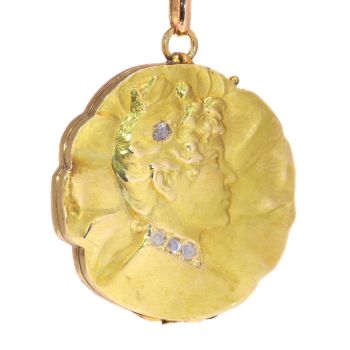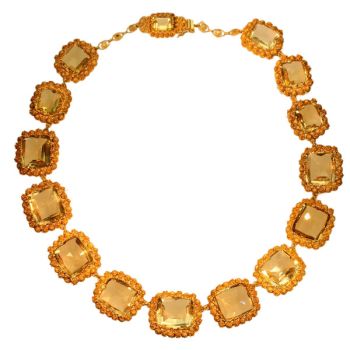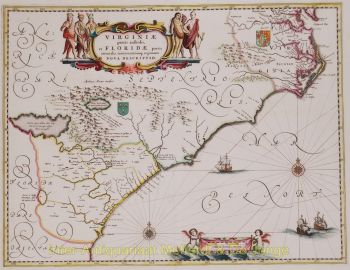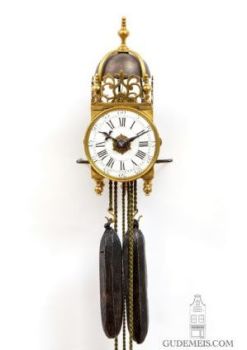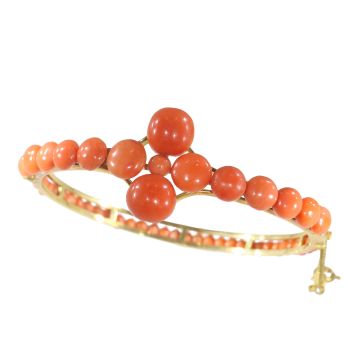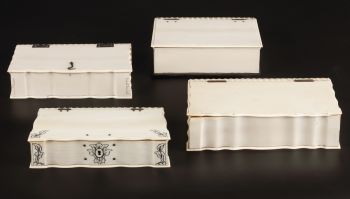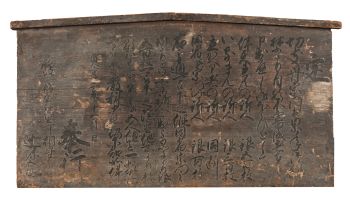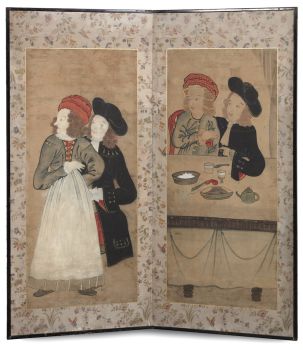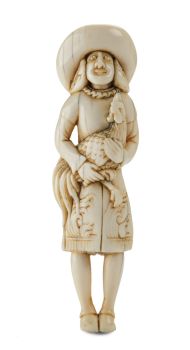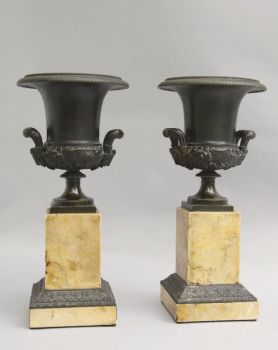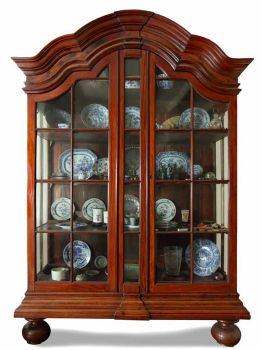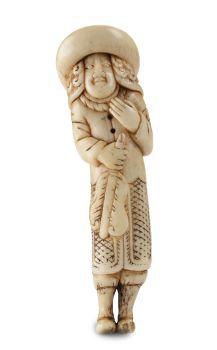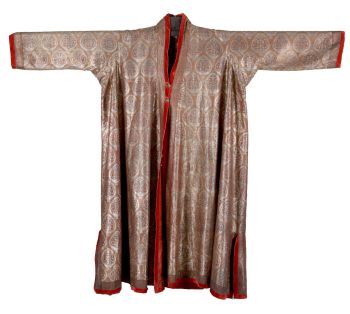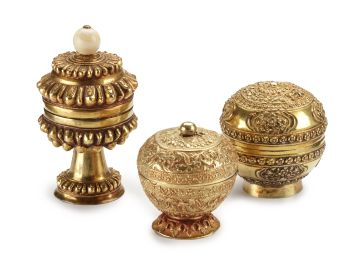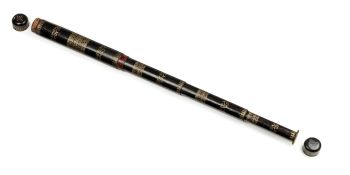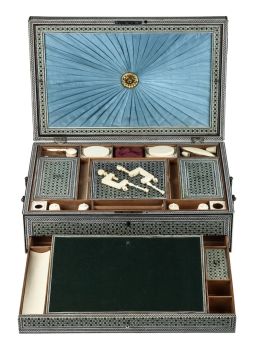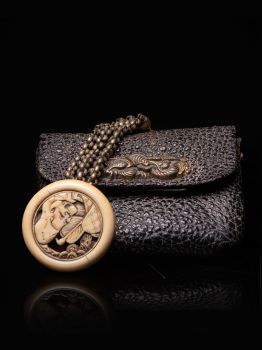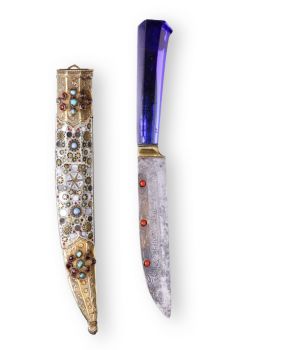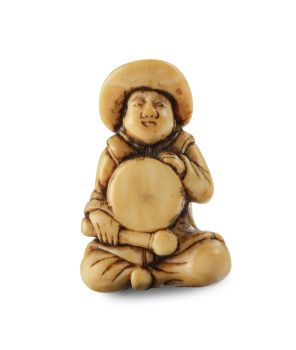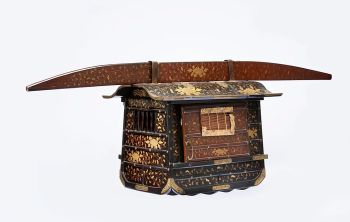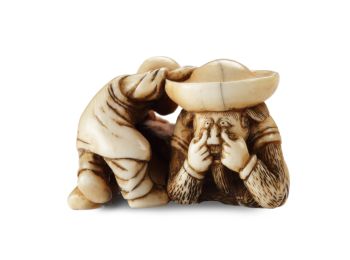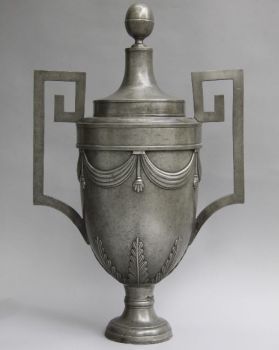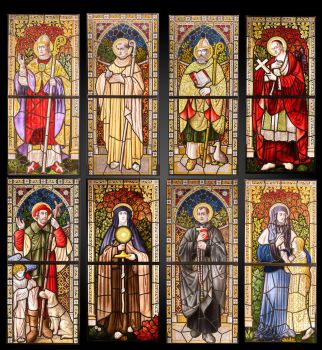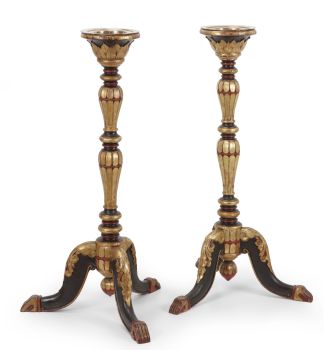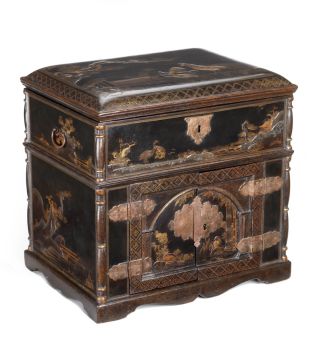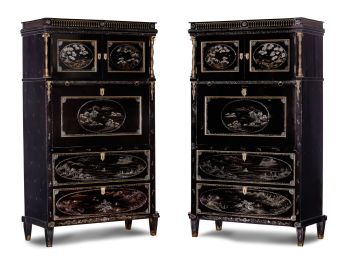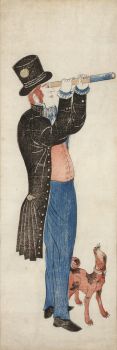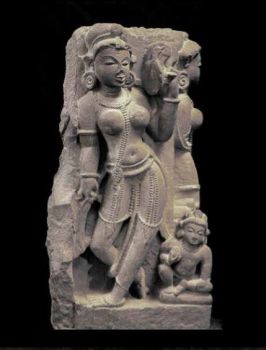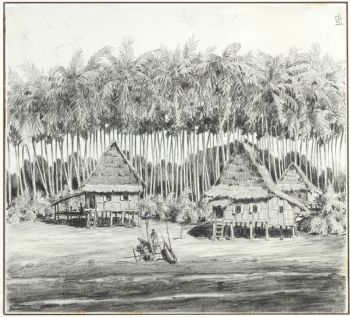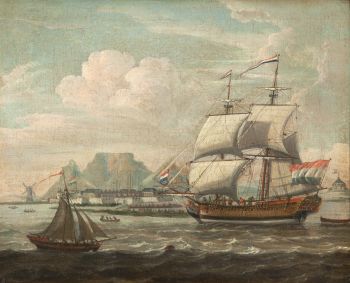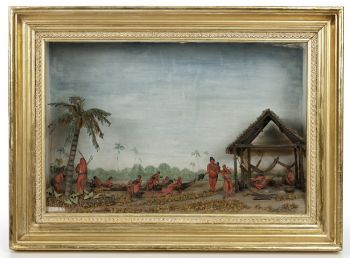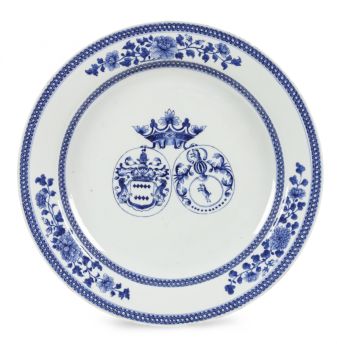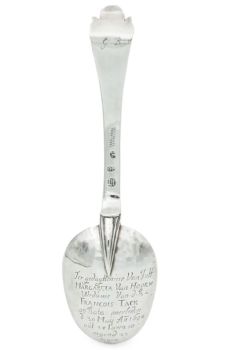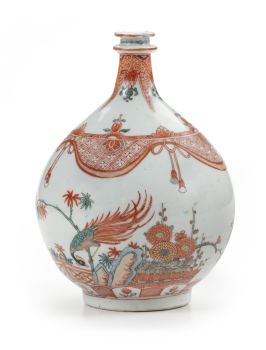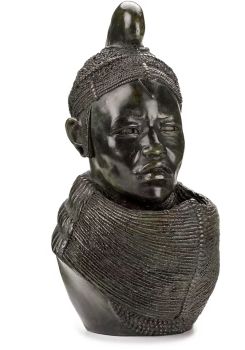A Lakota warrior’s feather headdress North or South Dakota, United States of America 1910 - 1930
Unknown artist
201 cm
Price on request
Zebregs & Röell - Fine Art - Antiques
- About the artworkH. 201 cm (incl. standard)
This ritual headdress consists of an assembly of 28 eagle feathers attached to a leather and felt hat using pieces of red fabric from uniforms of the American army or long strips of fabric of English origin exchanged at trading posts.
The feathers belong to the Golden Eagle (Aquila chrysaetos) and are decorated at the end with dyed red horsehair (Equus caballus). The top of the cap is ornamented with bells and fur that are visible between the feathers above the beaded band. A multicoloured beaded band featuring geometric patterns reminiscent of the shape of tepees unfolds at the forehead. The beads came from exchanges with American traders. Furthermore, the headdress has side pendants made of strips of coloured fabric. At the back of the headdress, under the central feather, a beautiful decorative element can be seen: a braided and dyed porcupine quill and a set of brown eagle feathers.
This type of eagle feather headdress was the most important and imposing symbol of prestige for the warriors of the Plains. Only prominent warriors earned the right to wear a full-feather headdress. According to the Lakota, the eagle is the symbol of sacred warrior power. More specifically, the eagle is considered the 'master of the sky and the birds', and its feathers are symbols of bravery and wisdom.
The down feathers, undulating with the slightest breath of air, were seen as a tool of communication with the spirit world. The making of a headdress gave rise to numerous ceremonies and songs celebrating the valour of the warrior for whom the headdress was intended. During the making of the headdress, each time a feather was added, one of the great feats of arms of the warrior was recalled. As such, once the headdress is finished, it constitutes a trophy recalling the many victories of the warrior and, more broadly, of the whole tribe. Within the tribe, only the chiefs and a limited number of men were authorized to wear a war cap. The wearing of the headdress was absolute proof of bravery in battle, and all members of the tribe owed respect to whoever wore it. Today, native leaders present feather headdresses to government officials and politicians to signify a diplomatic relationship.
This headdress was probably brought to Europe by a Lakota tribesman. Several groups of Lakota travelled Europe to perform and showcase their culture. During the expositions, they were often placed in a village-like setting where spectators could view them like in a zoo.
A comparable headdress can be found in the Metropolitan Museum of Art (on loan from the Eugene and Clare Thaw Collection, Fenimore Art Museum, Cooperstown).
Sources:
Marc Petit, Mémoires Indiennes, Champollion Museum, Figeac, 2011
Steve Friesen, Lakota Performers in Europe: Their Culture and the Artifacts They Left Behind, University of Oklahoma Press, Norman, 2017 - About the artist
It might happen that an artist or maker is unknown.
Some works are not to be determined by whom it is made or it is made by (a group of) craftsmen. Examples are statues from the Ancient Time, furniture, mirroirs, or signatures that are not clear or readible but as well some works are not signed at all.
As well you can find the following description:
•“Attributed to ….” In their opinion probably a work by the artist, at least in part
•“Studio of ….” or “Workshop of” In their opinion a work executed in the studio or workshop of the artist, possibly under his supervision
•“Circle of ….” In their opinion a work of the period of the artist showing his influence, closely associated with the artist but not necessarily his pupil
•“Style of ….” or “Follower of ….” In their opinion a work executed in the artist’s style but not necessarily by a pupil; may be contemporary or nearly contemporary
•“Manner of ….” In their opinion a work in the style of the artist but of a later date
•“After ….” In their opinion a copy (of any date) of a work of the artist
•“Signed…”, “Dated….” or “Inscribed” In their opinion the work has been signed/dated/inscribed by the artist. The addition of a question mark indicates an element of doubt
•"With signature ….”, “With date ….”, “With inscription….” or “Bears signature/date/inscription” in their opinion the signature/ date/ inscription has been added by someone other than the artist
Are you interested in buying this artwork?
Artwork details
Related artworks
- 1 - 4 / 12
Unknown artist
A COLLECTION OF FOUR SRI LANKAN IVORY BIBLE BOXES18th century
Price on requestZebregs & Röell - Fine Art - Antiques
Unknown artist
A IVORY NETSUKE OF A DUTCHMAN HOLDING A COCKEREL18th century
Price on requestZebregs & Röell - Fine Art - Antiques
Unknown artist
A MARINE IVORY NETSUKE OF A DUTCHMAN HOLDING A CHINESE FAN18th century
Price on requestZebregs & Röell - Fine Art - Antiques
Unknown artist
A RARE LARGE JAPANESE LACQUERED LEATHER TELESCOPE1750 - 1800
Price on requestZebregs & Röell - Fine Art - Antiques
Unknown artist
A RARE COMPLETE INDIAN SADELI INLAID WORK AND WRITING BOX1800 - 1850
Price on requestZebregs & Röell - Fine Art - Antiques
Unknown artist
A SMALL IVORY NETSUKE OF A DUTCHMAN WITH A DRUM1750 - 1800
Price on requestZebregs & Röell - Fine Art - Antiques
Unknown artist
A JAPANESE MODEL OF A NORIMONO, A PALANQUIN1650 - 1700
Price on requestZebregs & Röell - Fine Art - Antiques
Unknown artist
AN IVORY NETSUKE OF A DUTCHMAN FROLICKING WITH A SMALL BOY18th century
Price on requestZebregs & Röell - Fine Art - Antiques
Unknown artist
The Stamford Raffles Secretaires.1800 - 1813
Price on requestZebregs & Röell - Fine Art - Antiques
1 - 4 / 24Dutch School
Arrival of a Dutch East Indiaman in the Table Bay18th century
Price on requestZebregs & Röell - Fine Art - Antiques
Unknown artist
A silver spoon commemorating Juff’ Margareta van Hoorn1656 - 1694
Price on requestZebregs & Röell - Fine Art - Antiques
1 - 4 / 12

